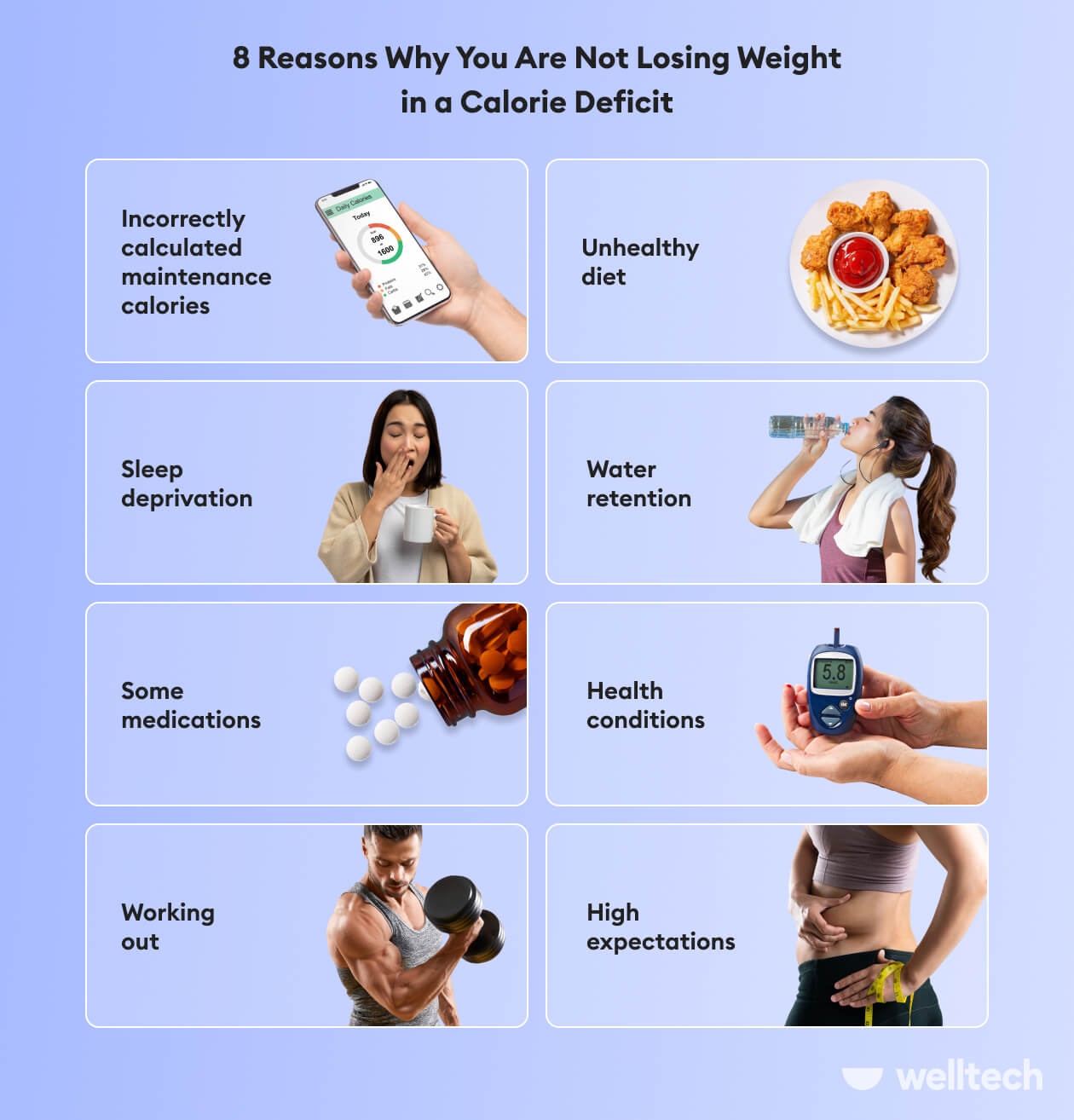You’re eating less but gaining weight. What gives?
It’s frustrating, right? You’re sticking to a calorie deficit. Yet, the scale shows higher numbers. This can be confusing and disheartening. There are several reasons why this happens. Factors like water retention, muscle gain, and even stress can play roles.
Understanding these can help you stay motivated. In this blog post, we’ll explore why your weight might be going up despite a calorie deficit. We’ll dig into common causes and how to address them. So, let’s uncover the mystery behind this weight gain puzzle.

Credit: www.reddit.com
Impact Of Water Retention
High sodium intake can cause your body to hold onto water. This extra water increases your weight. Processed foods often contain a lot of sodium. Eating less processed food can help reduce water retention. Drinking more water also helps flush out excess sodium. Keeping sodium levels low is important for weight management.
Hormonal changes can make you retain water. Women may notice this during their menstrual cycle. Hormones affect how your body stores water and salt. Stress can also impact your hormones. This can lead to temporary weight gain. Managing stress and staying hydrated can help. Regular exercise can also balance your hormones.
Muscle Gain Vs. Fat Loss
Strength training can make you gain weight. This weight is muscle. Muscle is heavier than fat. You may lose fat but gain muscle. This makes the scale go up. Your body looks more toned. Clothes fit better too. So, don’t panic.
Body composition means muscle, fat, and water. Eating fewer calories can cause changes. Muscle gain and fat loss can happen together. This can change your weight. But it’s healthy. Focus on how you feel. Not just the scale. You’re getting stronger. And healthier.
Digestive System Factors
Good gut health is important for weight control. Bad bacteria can affect digestion. This leads to bloating and weight gain. Eating foods high in fiber helps. Probiotics also support gut health. Kefir and yogurt are good sources. Drinking enough water is key too.
Food intolerances can cause weight gain. Your body reacts badly to certain foods. This can lead to bloating and water retention. Lactose and gluten are common culprits. Keeping a food diary helps identify problem foods. Avoiding these foods can reduce symptoms.

Credit: thebodybulletin.com
Sleep And Stress Levels
Cortisol is a stress hormone. High levels of cortisol can lead to weight gain. Even if you are in a calorie deficit, cortisol can make your body store fat. Stress can cause this hormone to rise. This can make weight loss harder. Reducing stress is important for weight management.
Good sleep is crucial for weight loss. Poor sleep can affect your metabolism. It can also increase hunger hormones. This makes you eat more. Even a calorie deficit may not work well without enough sleep. Aim for at least 7-8 hours of good sleep each night. This helps your body function better.
Inaccurate Calorie Tracking
Many people struggle with portion sizes. Even small mistakes can add up. Using a food scale helps. Measuring cups are useful too. Eating out makes it harder. Restaurants serve big portions. It’s easy to eat too much. Keeping a food diary can help. Write down everything you eat. Be honest. This helps you track better.
Hidden calories are tricky. They sneak into your diet. Drinks often have hidden calories. Soda and juice are common culprits. Coffee drinks can be high in calories too. Condiments add calories as well. Ketchup, mayo, and dressings are sneaky. Snacks can be misleading. Healthy snacks sometimes contain hidden calories. Check labels carefully. Look for hidden sugars and fats.

Credit: welltech.com
Medical Conditions
Thyroid problems can make weight loss hard. An underactive thyroid slows metabolism. This means you burn fewer calories. You might feel tired and cold often. Even with a calorie deficit, weight may go up.
Some medications cause weight gain. Antidepressants, steroids, and diabetes drugs can be culprits. These drugs change the way your body stores fat. It’s not your fault. Always talk to your doctor if you notice weight gain.
Exercise Type And Frequency
Cardio burns a lot of calories fast. Running, biking, and swimming are good options. But strength training builds muscle. Muscle helps burn calories even when resting. Balance both types for the best results.
Too much exercise can cause weight gain. Overtraining leads to water retention and stress. Stress increases the hormone cortisol. High cortisol can make you gain weight. Rest days are important. Allow your body to recover. Keep exercise balanced and moderate.
Timing Of Weigh-ins
Weight fluctuations can happen even in a calorie deficit due to water retention or muscle gain. Weigh-ins at different times can show variations. Consistent timing helps track true progress.
Daily Fluctuations
Weight can change daily due to many reasons. Water retention is one cause. Eating salty food can make you retain water. Hormones can also affect your weight. Weighing yourself at different times can show different numbers. Try to weigh yourself at the same time each day. This helps to see a more accurate trend.
Consistency In Measurement
Using the same scale is very important. Scales can show different numbers. Always use the same one for best results. Wear similar clothing each time you weigh yourself. Clothes can add extra weight. Consistency is key. This helps to see real changes in your weight.
Frequently Asked Questions
Can Stress Cause Weight Gain In A Calorie Deficit?
Yes, stress can lead to weight gain even in a calorie deficit. High stress levels increase cortisol production, which can cause water retention and fat storage.
Is Water Retention Affecting My Weight Loss?
Water retention can affect weight loss and result in temporary weight gain. Factors like high sodium intake, hormonal changes, and dehydration can lead to water retention.
Could Muscle Gain Explain Weight Increase?
Yes, muscle gain can explain weight increase. When you’re in a calorie deficit, you can still build muscle, which weighs more than fat.
Why Does My Weight Fluctuate Daily?
Daily weight fluctuations are normal and can be caused by factors like hydration levels, food intake, and hormonal changes.
Conclusion
Understanding why weight goes up in a calorie deficit can be frustrating. Remember, muscle gain, water retention, or hormonal changes can be factors. Always track progress with measurements and not just the scale. Patience and consistency are key. Listen to your body and adjust your plan as needed.
Consult a professional if unsure. Stay positive and keep moving forward. Your health journey is unique, so trust the process.